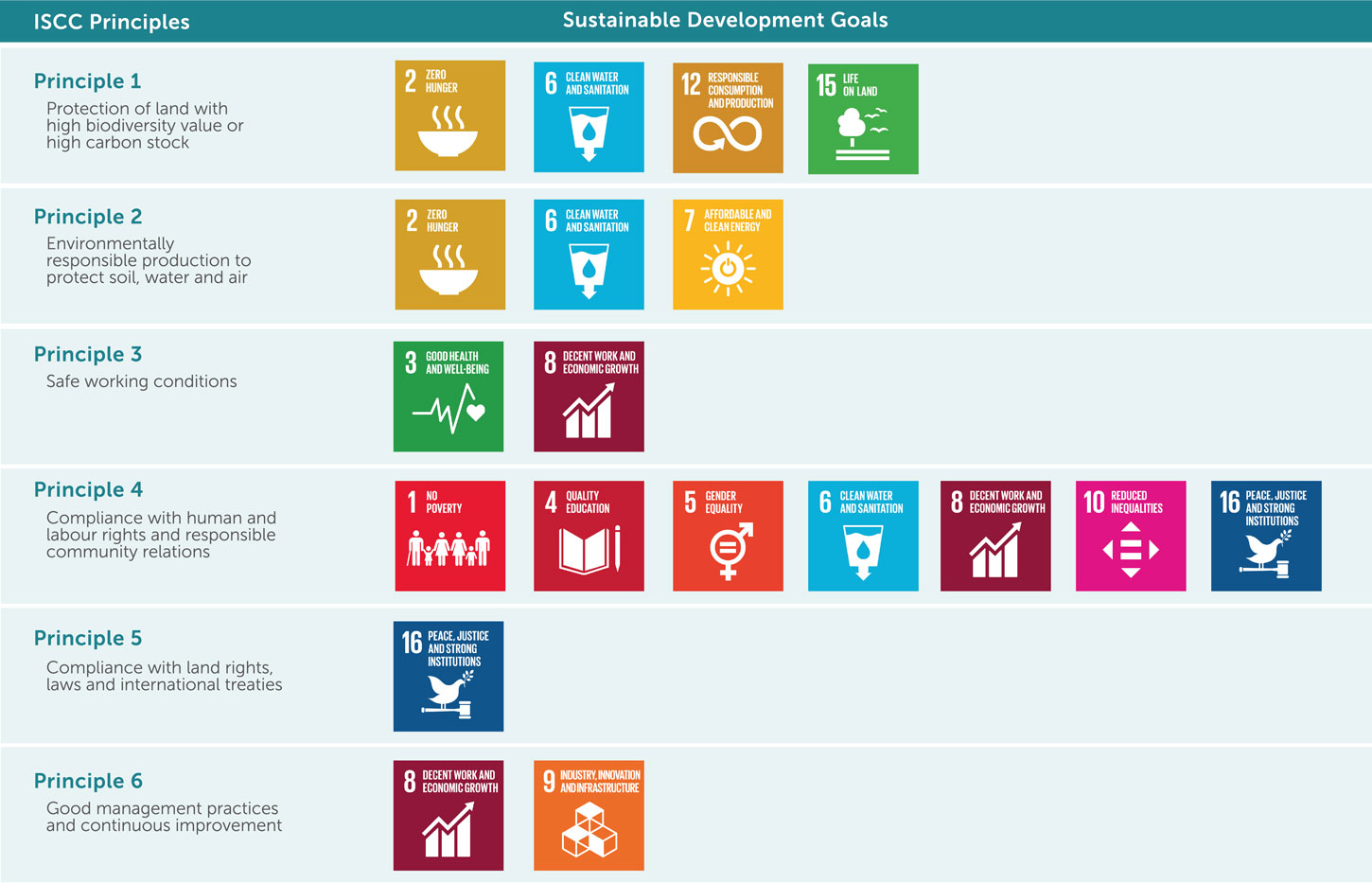ISCC Supports the Sustainable Development Goals
The 2030 Agenda for Sustainable Development adopted by all UN Member States in 2015 aims to foster peace and prosperity for people and the planet, today and in the future. At its heart are the 17 Sustainable Development Goals (SDGs) which call for climate action, environmental conservation, an end to poverty, improved health and education, reduced inequality and economic growth. Especially the private sector is called upon to contribute to a sustainable development. Therefore, ISCC supports businesses to act more responsibly and secure sustainability throughout the entire supply chain. However, ISCC is aware of the challenges and seeks to continuously improve its contribution to the fulfilment of the SDGs.
ISCC Principles and the Sustainable Development Goals
The report “Linking Voluntary Standards to Sustainable Development Goals”, published by the International Trade Centre on 07 October 2020, has analysed how 232 voluntary sustainability standards connect their requirements to the SDGs. According to the report, ISCC’s certification requirements support more than half of the SDGs to a special degree. For example, a strong connection has been linked to SDG 1 (“No Poverty”), SDG 6 (“Clean Water and Sanitation”), SDG 12 (“Responsible Consumption and Production”) and SDG 15 (“Life on Land”).
A Closer Look: ISCC Principles and the SDGs
A Closer Look at Some of the SDGs that ISCC Supports Through Certification

Until today, the majority of the world’s farms are managed by independent smallholders. Therefore, it is very important to ISCC to be supportive of them. ISCC introduced a certification concept for Independent Smallholders (ISH) that is applicable to smallholders all over the world producing agricultural raw materials. The mission is to improve livelihood, market access and agricultural performance, as well as environmental protection and social welfare of independent smallholders.

Since 2018, ISCC is an official partner of the Food Security Standard (FSS) Project established by WWF, Welthungerhilfe and ZEF (Center for Development Research) with support of the German Ministry for Food and Agriculture. The FSS provides a set of practical and measurable criteria that can be integrated into existing sustainability standards. It is based on the Human Right to adequate Food. During the FSS pilot project, the FSS was successfully integrated into two regular ISCC audits at sugar cane plantations in Latin America. It can now be integrated in regular ISCC audits.

For ISCC, education is key to a sustainable future. Therefore, we provide education on sustainable agricultural production, including soil, water and air protection, zero deforestation as well as human and labour rights in ISCC Basic Training courses. In addition, ISCC offers specific training courses such as the ISCC Greenhouse Gas Training to educate companies on how to calculate their greenhouse gas emissions and deepen their understanding on greenhouse gas requirements.

Since 2016, ISCC participates in a cooperation with AahrusKarlsham (AAK) to support women in the Shea industry to access new markets and become more independent. ISCC developed a certification approach especially for shea supply chains. This allows many women collecting shea nuts to be included in the sustainability certification process.

ISCC supports the circular economy and bioeconomy with a multi-stakeholder, third-party sustainability certification scheme. Recycled or bio-based products that are certified to the ISCC PLUS standard provide companies, brand owners and consumers with the assurance that high sustainability requirements are met. For stakeholder that want to learn more about the certification approach, ISCC offers an ISCC PLUS Training – Circular Economy and Bioeconomy.

ISCC is committed to combating deforestation, the loss of biodiversity and dwindling carbon stocks. The multi-stakeholder, third-party ISCC certification system promotes deforestation-free supply chains by prohibiting the conversion of land with high biodiversity value or high carbon stock for the production of biomass. Furthermore, the ISCC EU certification system for EU biofuels production requires minimum emissions savings to be achieved and thus, contributes to the reduction of greenhouse gas emissions worldwide.
In addition, ISCC partners with the German conservation organisation “Nationale Naturlandschaften” to increase biodiversity within in the Thuringia Forest and with Angora Natura to restore the landscape and former biodiversity in Bavaria’s largest remaining low-lying wetlands “Freisinger Moos”.

Since 2018, ISCC continuously supports the Global Risk Assessment Services (GRAS) tool. The online tool provides solutions to demonstrate compliance with sustainability requirements, detect deforestation and grassland conversion, manage sustainability risks and facilitate certification. Within its web application, GRAS displays georeferenced data about biodiversity, carbon stock, land-use change and social indices and allows users to conduct their own sustainability risk assessment.

ISCC has been developed through an open multi-stakeholder process. During the annual ISCC Global Sustainability Conference participants from industry, certification bodies, NGOs and national authorities discuss topics such as sustainable bio-based and circular supply chains, regulatory framework conditions, smallholder certification, and successful implementations of sustainability measures. ISCC organises regular Regional and Technical Stakeholder Meetings. ISCC is also committed to the UN Global Compact in order to show that businesses need to take responsibility to ensure a sustainable future.
